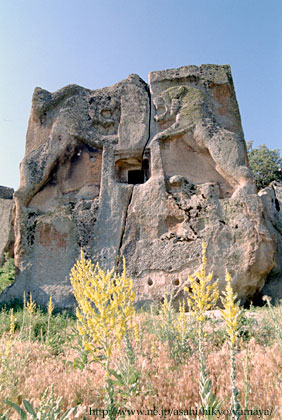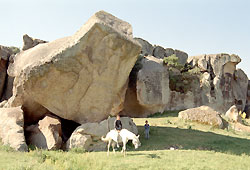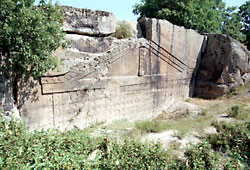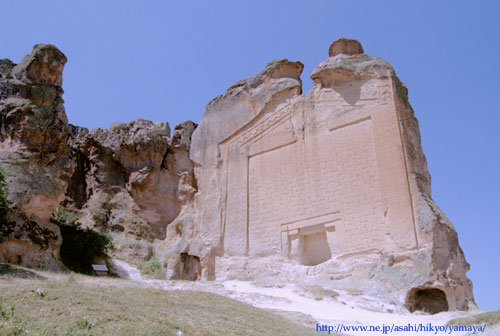The exhibit, held under scientific advice from archaeologist Taciser Sivas, will run until April 13.

Posted on 01/01/2008 4:46:12 PM PST by SunkenCiv
Istanbul's Yapi Kredi Vedat Nedim Tor Museum is hosting an archaeology exhibition called "Phrygia," showcasing a selection of major Phrygian artifacts on loan from various museums in Turkey, including the Museum of Anatolian Civilizations in Ankara and the Istanbul Archaeology Museum.
The exhibit, held under scientific advice from archaeologist Taciser Sivas, will run until April 13.
(Excerpt) Read more at todayszaman.com ...
|
|
|||
Gods |
To all -- please ping me to other topics which are appropriate for the GGG list. |
||
|
· Mirabilis · Texas AM Anthropology News · Yahoo Anthro & Archaeo · · History or Science & Nature Podcasts · Excerpt, or Link only? · cgk's list of ping lists · |
|||
There are just too many phrygian cultures to keep up with.
Happy New Year SunkenCiv!
Regards
:’) HNY2U2.
|
|
||
| Archaeologists Rewrite Timeline Of Bronze And Iron Ages, Alphabet |
||
| Posted by blam On News/Activism ^ 12/24/2001 8:04:31 AM EST · 19 replies · 478+ views Cornell University | 12-19-2001 | Blaine P. Friedlander Jr. Archaeologists rewrite timeline of Bronze and Iron Ages, including early appearance of alphabet FOR RELEASE: Dec. 19, 2001 Contact: Blaine P. Friedlander Jr. Office: 607-255-3290 E-Mail: bpf2@cornell.edu ITHACA, N.Y. -- Using information gleaned from the sun's solar cycles and tree rings, archaeologists are rewriting the timeline of the Bronze and Iron Ages. The research dates certain artifacts of the ancient eastern Mediterranean decades earlier than previously thought. And it places an early appearance of the alphabet outside Phoenicia at around 740 B.C. Writing in two articles in the forthcoming issue of the journal Science (Dec. 21), archaeologists from Cornell University ... |
||
|
|
||
| So Who Is Buried in Midas's Tomb? |
||
| Posted by a_Turk On News/Activism 12/24/2001 10:12:01 PM PST · 6 replies · 1+ view NYT | 12/25/2001 | John Noble Wilford Refinements of radiocarbon dates appear to rob the monumental tomb at Gordion of its claim to having been the final resting place of the illustrious King Midas, researchers reported last week in the journal Science. American and European scientists analyzed the effects of the sun's cycles on amounts of radioactivity absorbed from year to year, as recorded in tree rings. They said the research had given archaeologists and historians a more precise chronology for the Middle East and Aegean regions in the Bronze and Iron Ages. One of the researchers, Dr. Peter I. Kuniholm, an archaeologist at Cornell University, said ... |
||
|
|
||
| Archaeologists Find Celts in Unlikely Spot: Central Turkey |
||
| Posted by a_Turk On News/Activism 12/24/2001 10:20:40 PM PST · 52 replies · 123+ views NYT | 12/25/2001 | John Noble Wilford In storybook histories, the ancient city of Gordion is remembered only as the seat of King Midas, he of the golden touch, and the place where Alexander the Great struck a famous blow in legend and metaphor. Challenged to separate the strands of an impossible knot, the Gordion knot, the conqueror cut through the problem, in the manner of conquerors, with one authoritative swing of his sword. After Midas and Alexander, Gordion languished on the fringes of history, and until recently archaeologists had taken little notice of its Celtic past. Yes, European Celts -- the Gauls of Roman times and ... |
||
|
|
||
| Lost No More: An Etruscan Rebirth |
||
| Posted by blam On News/Activism 04/15/2003 10:36:32 AM PDT · 4 replies · 25+ views New York Times | 4-15-2003 | John Noble Wilford Lost No More: An Etruscan Rebirth By John Noble WilfordNY Times, 4-15-2003 HILADELPHIA -- The Romans relished their founding myths. Aeneas, a fugitive from fallen Troy, anchored in the mouth of the Tiber River and there in the hills of Latium rekindled the flame of Trojan greatness. Romulus and Remus, twin sons of Mars and a sleeping beauty, were suckled by a she-wolf and grew up to establish the city destined for grandeur. In reality, though, the Romans owed more than they ever admitted to their accomplished predecessors and former enemies on the Italian peninsula, the Etruscans. They were known... |
||
|
|
||
| Scientists Say Warfare Began After People Formed Villages |
||
| Posted by blam On News/Activism 09/16/2003 5:33:47 PM PDT · 44 replies · 29+ views Seattle Times | 9-16-2003 | Dan Vergano Scientists say warfare began after people formed villages By Dan Vergano Gannett News Service From ancient Troy to today's Iraq, warfare forms the backdrop of human history. But anthropologists, archaeologists and other scholars tend to disagree on war's origins: Some see it as an ailment of civilization and others say it has deeper roots. Two anthropologists from the University of Michigan, Ann Arbor, suggest that although people could have come into conflict before civilization, archaeological remains of burning homes, fleeing refugees and slain captives show simple raids steadily maturing into full-scale warfare as humans settled into villages and society became... |
||
|
|
||
| Scientists Unearth Urban Center More Ancient Than Plato |
||
| Posted by sarcasm On General/Chat 12/01/2003 9:25:02 PM PST · 14 replies · 5+ views The New York Times | December 2, 2003 | John Noble Wilford Digging on a coastal plain at the Gulf of Corinth three years ago, archaeologists came upon some ruins of Helike, a Greek city destroyed by earthquake in Plato's time. A search for the rest of Helike has now turned up something even more ancient, rare and inviting.The archaeologists say they have uncovered the stone foundations, cobbled streets and pottery of a well-preserved 4,500-year-old urban center, one of the few Early Bronze Age communities ever found on the Greek mainland.Preliminary investigation at the prehistoric site, the researchers say, reveals that this was a prosperous town at the time pre-Homeric Troy enjoyed... |
||
|
|
||
| The Truth About An Epic Tale Of Love, War And Greed (Troy) |
||
| Posted by blam On News/Activism 03/25/2004 12:03:11 PM PST · 13 replies · 10+ views The Telegraph (UK) | 3-24-2004 The truth about an epic tale of love, war and greed (Filed: 24/03/2004) The legend of Troy has an enduring grip on the imagination. Aidan Laverty talks to the scientists who say they have proved that a siege really took place It's one of the greatest stories ever; the tale of a war fought over the love of Helen, the most beautiful woman in the world. Now as Hollywood breathes fresh life into the myth, archaeologists have uncovered new evidence from the site of Troy that brings us closer than ever to the truth behind this ancient legend. City scan:... |
||
|
|
||
| Non-Attic Characters |
||
| Posted by SunkenCiv On News/Activism 07/18/2004 6:43:19 PM PDT · 11 replies · 458+ views University of California, Irvine, Thesaurus Linguae Graecae | September 7 2003 (rev 9-28-2003) | Nick Nicholas The first character is the sampi, as it was used (briefly) in the Ionic alphabet as a sibilant. The first question to answer is whether it should be separated from the numerical sampi at all... The second question is what the phonetic value of sampi was... Jeffery (1990:39)... also suspects that sampi was originally borrowed from Carian, and used to express the Carian sibilant in loanwords... In the pre-Hellenic language of Lemnos (possibly related to Etruscan), it is used, but Jeffery has no idea what it sounded like. In the older inscriptions of the non-Hellenic language of Phrygia (related... |
||
|
|
||
| Was There a Trojan War? |
||
| Posted by SunkenCiv On General/Chat 07/29/2004 11:43:38 PM PDT · 5 replies · 124+ views Archaeology | May/June 2004 | Manfred Korfmann A spectacular result of the new excavations has been the verification of the existence of a lower settlement from the seventeenth to the early twelfth centuries B.C. (Troy levels VI/VIIa) outside and south and east of the citadel. As magnetometer surveys and seven excavations undertaken since 1993 have shown, this lower city was surrounded at least in the thirteenth century by an impressive U-shaped fortification ditch, approximately eleven and a half feet wide and six and a half feet deep, hewn into the limestone bedrock. Conclusions about the existence and quality of buildings within the confines of the ditch... |
||
|
|
||
| Amazon Warrior Women |
||
| Posted by blam On News/Activism 08/04/2004 8:51:53 PM PDT · 25 replies · 633+ views PBS | Current | PBS Amazon Warrior WomenThis painting on a Greek vase depicts an Amazon woman warrior on horseback engaged in battle.Amazons in myth: History's first mention of a race of warrior women comes in Homer's ILIAD, an account of the Trojan War, probably written in the 8th to the 7th century B.C. Homer's Amazons, a race of fierce women who mated with vanquished male foes and kept only the female children they bore, were believed to occupy the area around the Black Sea. Amazon women also crop up in other Greek myths. One of the labors of Hercules, for example, required him to... |
||
|
|
||
| The Argonaut Epos and Bronze Age Economic History |
||
| Posted by SunkenCiv On General/Chat 08/25/2004 10:30:51 PM PDT · 2 replies · 80+ views Economics Department, City College of New York | Revised May 14, 1999 | Morris Silver The island group of the northeast Aegean (Lemnos, Lesbos, Chios, and others) was the cradle of the culture which created the prehistoric cities of Polichne on Lemnos and Therme on Lesbos, both of which may be considered the earliest urban centres in Europe. Their origins can be traced back as far as the end of the fourth millennium B.C.. ... The origins of these "urban" settlements, at least in the case of Poliochne, may be traced back much further than the time of the founding of Troy. ... Troy with its long-lived occupation, is but a small fortified village... |
||
|
|
||
| Laocoon and His Son |
||
| Posted by SunkenCiv On General/Chat 08/28/2004 4:07:50 PM PDT · 2 replies · 55+ views Vatican Museums | circa 2000 | Mary Ann Sullivan One of the major discoveries of the Italian Renaissance, this sculptural grouping was found in Rome in 1506 in the ruins of Titus' palace. It depicts an event in Vergil's Aeneid (Book 2). The Trojan priest Laocoon was strangled by sea snakes, sent by the gods who favored the Greeks, while he was sacrificing at the altar of Neptune. Because Laocoon had tried to warn the Trojan citizens of the danger of bringing in the wooden horse, he incurred the wrath of the gods. |
||
|
|
||
| Greek sculpture 'from throne of Midas' [2002] |
||
| Posted by SunkenCiv On General/Chat ^ 04/24/2007 11:51:46 AM EDT · 10 replies · 294+ views BBC | Friday, January 4, 2002 | unattributed A sculpture found in Greece in 1939 may have been part of King Midas' lost throne, an archaeologist has said. The 23cm-tall ivory sculpture, known to scholars as The Lion Tamer, has puzzled historians of classical Greece since its discovery... Keith DeVries, of the University of Pennsylvania's Museum of Archaeology and Anthropology, said there are signs that it once adorned Midas' royal throne... Mr DeVries said the sculpture appears to be Phrygian and to have been produced around the time that Midas was alive... According to Mr DeVries, Midas donated his throne as a gift to Delphi, where it was... |
||
|
|
||
| Yapi Kredi Museum exhibit explores Phrygian culture |
||
| Posted by SunkenCiv On General/Chat ^ 01/01/2008 7:46:12 PM EST · 4 replies Today's Zaman | Wednesday, January 2, 2008 | unattributed Istanbul's Yapi Kredi Vedat Nedim Tor Museum is hosting an archaeology exhibition called "Phrygia," showcasing a selection of major Phrygian artifacts on loan from various museums in Turkey, including the Museum of Anatolian Civilizations in Ankara and the Istanbul Archaeology Museum. The exhibit, held under scientific advice from archaeologist Taciser Sivas, will run until April 13. |
||
Well, does that phrygian fridge still work?
It lasted a mere 45 years.

METROPOLIS (Ayazin Köyü-Afyon), Phryg kaya yerleşimleri.Phrygia'nın önemli kentlerinden biridir. Görsel kalıntıları tatmin edicidir.

ASLANTAŞ FRİG ANITI Seyitgaz - Afyon anayolundan sapılarak ulaşılır. Göynüş Vadisinde yer alır. Yakınında yerleşim yeri yoktur. Yolu asvaltlanmış, ulaşımı kolaydır.
GESUNDHEIT! (Prhygia-aslanta, look at the lions! Have you seen this before?)
Wasn’t one of the moons around Ming the Merciless’ planet named Phrygia in “Flash Gordon?” I think the Hawkmen lived there...or not. It’s been a while.
Never saw it. :’) Using real-life names in fiction seems to be common though.
At first those I thought those pics were of Roman or post-Roman Christian hideouts, carved into the cliffs, but those lions on their hinds and facing each other is a Phrygrian (and Mycenaean) motif.



Those images are from Phrygian sites though?
It’s a very earthquake-prone part of the world unfortunately.

The above is described as The temple to Mita (Kybele) the Anotolian fertility goddess at Midas Sehri
http://www.varchive.org/dag/lionga.htm
“The Lion Gate of Mycenae
The Lion Gate of Mycenae was the entrance to the city. Atop the gate, two lions rampant are carved in stone relief. Similar bas-reliefs of two lions rampant facing each other are found in a number of places in Phrygia in Asia Minor...”
A famous plate showing the Phrygian goddess Cybele in her lion-drawn chariot, the Greek sun god Helios, and an Iranian fire altar.
www.livius.org
You never told me Gordion had a Tumulus...
http://www.people.umass.edu/bwhitchu/MidasIndexGordionTumulusKingMidas20002.jpg
Disclaimer: Opinions posted on Free Republic are those of the individual posters and do not necessarily represent the opinion of Free Republic or its management. All materials posted herein are protected by copyright law and the exemption for fair use of copyrighted works.